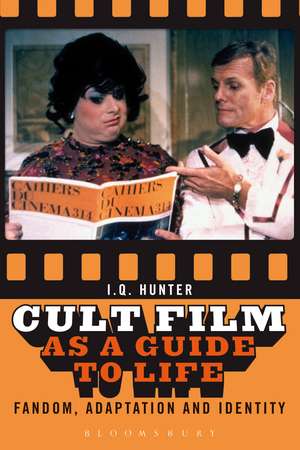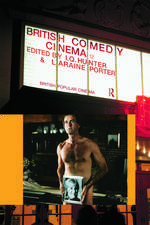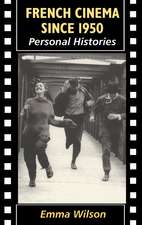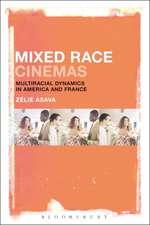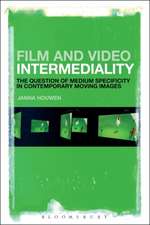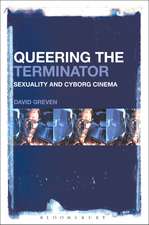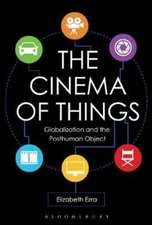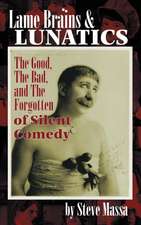Cult Film as a Guide to Life: Fandom, Adaptation, and Identity
Autor I. Q. Hunteren Limba Engleză Paperback – 7 sep 2016
| Toate formatele și edițiile | Preț | Express |
|---|---|---|
| Paperback (1) | 191.38 lei 6-8 săpt. | |
| Bloomsbury Publishing – 7 sep 2016 | 191.38 lei 6-8 săpt. | |
| Hardback (1) | 831.43 lei 6-8 săpt. | |
| Bloomsbury Publishing – 7 sep 2016 | 831.43 lei 6-8 săpt. |
Preț: 191.38 lei
Preț vechi: 222.59 lei
-14% Nou
Puncte Express: 287
Preț estimativ în valută:
36.63€ • 38.10$ • 30.70£
36.63€ • 38.10$ • 30.70£
Carte tipărită la comandă
Livrare economică 14-28 martie
Preluare comenzi: 021 569.72.76
Specificații
ISBN-13: 9781623565107
ISBN-10: 1623565103
Pagini: 232
Ilustrații: 25 bw illus
Dimensiuni: 152 x 229 x 20 mm
Greutate: 0.34 kg
Editura: Bloomsbury Publishing
Colecția Bloomsbury Academic
Locul publicării:New York, United States
ISBN-10: 1623565103
Pagini: 232
Ilustrații: 25 bw illus
Dimensiuni: 152 x 229 x 20 mm
Greutate: 0.34 kg
Editura: Bloomsbury Publishing
Colecția Bloomsbury Academic
Locul publicării:New York, United States
Caracteristici
Introduces students to key concepts and demonstrates how to contextualize cult films and their adaptations
Notă biografică
I.Q. Hunter is Professor of Film Studies at De Montfort University, UK, and the author of British Trash Cinema (2013), editor of British Science Fiction Cinema (1999) and co-editor of British Comedy Cinema (2012) and The Routledge Companion to British Cinema History (2016).
Cuprins
Preface 1 For Virgins Only: A Brief Introduction to Cult Film2 Beaver Las Vegas! A Fanboy's Defence of Showgirls 3 Wasting Time in the Stanley Hotel5 Cult Adaptations5 Exploitation as Adaptation6 Erotic Inferno7 Tolkien Dirty8 From Adaptation to Cinephilia: An Intertextual Odyssey9 Cult film as a Guide to LifeNotesIndex
Recenzii
A remarkably self-critical reflection on Hunter's own contribution to scholarship and the wider state of academic work in his field.
I.Q. Hunter has seen everything, read everything, remembered everything, and miraculously retained all his fan's love for a wildly improbable filmography stretching from Casablanca to Pink Flamingos, from Plan Nine from Outer Space to The Rocky Horror Picture Show. His autobiographical framework and his impassioned, inimitable voice drive this valentine to all things cultish with wit, vigor, and irresistible appeal without ever sacrificing razor-sharp analysis or theoretical sophistication. The result is one of those rare academic monographs you can read for fun. Whether or not cult film can indeed save your life, writing like Hunter's could go a long way to save cinema studies from itself.
Cult Film as a Guide to Life is an elegant exploration of a number of themes and debates such as cult adaptations, cultural capital and exploitation cinema. Weaving together a number of essays, cult film expert Hunter probes why these films are so important to those who love them and, in the final chapter, begins to outline how they can indeed function as a "guide to life".
In his characteristically bold and distinctive way, I. Q. Hunter raises vital questions, provokes debate and sets the agenda for new approaches within the continually shifting and evolving field of cult film studies. Cult Film as a Guide to Life is an engaging, highly readable and endlessly thought-provoking book.
I.Q. Hunter has seen everything, read everything, remembered everything, and miraculously retained all his fan's love for a wildly improbable filmography stretching from Casablanca to Pink Flamingos, from Plan Nine from Outer Space to The Rocky Horror Picture Show. His autobiographical framework and his impassioned, inimitable voice drive this valentine to all things cultish with wit, vigor, and irresistible appeal without ever sacrificing razor-sharp analysis or theoretical sophistication. The result is one of those rare academic monographs you can read for fun. Whether or not cult film can indeed save your life, writing like Hunter's could go a long way to save cinema studies from itself.
Cult Film as a Guide to Life is an elegant exploration of a number of themes and debates such as cult adaptations, cultural capital and exploitation cinema. Weaving together a number of essays, cult film expert Hunter probes why these films are so important to those who love them and, in the final chapter, begins to outline how they can indeed function as a "guide to life".
In his characteristically bold and distinctive way, I. Q. Hunter raises vital questions, provokes debate and sets the agenda for new approaches within the continually shifting and evolving field of cult film studies. Cult Film as a Guide to Life is an engaging, highly readable and endlessly thought-provoking book.
